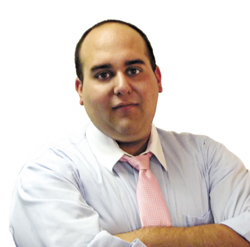@nicgarcia: Doomed to repeat history in Pueblo

History may be on the verge of repeating itself – this time in Pueblo.
The story so far: A Colorado municipality has extended a sliver of equality to the gay and lesbian community and an outraged citizen has decided to have it overturned by a vote of the people.
More specifically, Pueblo’s City Council passed 6-1 an ordinance to extend partner benefits to employees in same-gender relationships.
The ordinance came to exist after a bit of controversy. The council was set to pass the ordinance Sept. 10 after vetting the ordinance at two previous meetings. But in a moment of hysteria and worry, supporters on council killed the bill because they believed there would not be enough votes to pass the new language.
Members of the LGBT and allied community who worked with council members and city staff to draft the language, research the costs – less than one percent of the city’s total budget – and outline benefits for the city were incensed. They rightly felt betrayed.
So they gathered to decide what to do next at a community meeting. Daneya Esgar, the organizer of Equality Pueblo, said three city councilmembers recommitted their support to the ordinance and it was decided they’d try again. An identical ordinance was proposed and had two readings leading up to public comments and a final vote by council Oct. 9.
Nine people testified in favor of the proposed changes. Seven spoke against it.
One of those individuals who expressed concern was Mark Aliff.
“In reality, this isn’t about inclusion … but fiscal responsibility and what the will of the people is.”
He was referring to Referendum I, a 2006 proposal to extend domestic partnerships to Colorado’s gays and lesbians. Ref I shared the ballot with Amendment 43, a proposal to define marriage in Colorado between a man and a woman. Ref I failed. Amendment 43 passed.
“I would assume my politicians would stand up for the legality,” Aliff said.
It would appear that Aliff, like most of the others who spoke out against the ordinance, believe extending partner benefits to same-gender partners is just another point on the Gay Agenda to ruin the United States.
He went on to argue that seven people (members of city council) should not have the audacity to override the voters. Aliff suggested the ordinance should be put on the ballot.
If that sounds familiar, it should. It’s one of the same arguments Republican leaders at the Colorado General Assembly made during session when they blocked the Colorado Civil Union Act.
As I said previously, Pueblo City Council did finally approve extending benefits to city employees’ same-gender partners. But what should have been the end of it, seems to have only been the beginning.
Still outraged, Aliff has drafted a petition seeking remedies to undo the council’s vote. He and a group of like-minded individuals are circulating the petition Sunday afternoons at various churches in Pueblo. One of those churches is the one my father attends. He was approached after the service. One of his fellow parishioners told him city council gave gays and lesbians “special rights.” I told my father the real “special right” at least in the state of Colorado, belonged to those in opposite gender relationships: the right, the privilege to marry.
So here we are, 20 years almost to the day after Colorado voters passed Amendment 2, a law forbidding cities and counties from extending protections to the LGBT community. And it all started when a Colorado municipality extended a sliver of equality to the gay and lesbian community and an outraged citizen decided to have it overturned by a vote of the people. That municipality was Denver.
You see, the story before Amendment 2, the story that is often forgotten, is that Denver’s City Council passed its own ordinance extending protectionsw to gays and lesbians under the established non-discrimination act. A few locals didn’t like that, so they tried to have the voters overturn the new policy. Voters stood by city council and the gay community. That’s when Colorado Springs – and eventually, the Supreme Court – got involved.
Watching the Pueblo City Council meeting, I found it rather poetic one of the opponents to policy, a Biblical scholar said, “He who will not read is condemned and confined to the present, for the past and the future will be unknown to him.”
He suggested city council read the Bible. I suggest he read Romer v. Evans.
What's Your Reaction?
Out Front contributor Nic Garcia is a lifelong journalist and works for Colorado education policy news organization EdNewsColorado. He was an Out Front managing editor, associate publisher and executive editor from 2011 to 2013.










